How to Get Control of Your Time and Your Life
Content
1. Why You Should Care About Your Time
Time is Life / Work smarter, not harder / Enjoy life more / Thousands have benefited
and so can you
2. Your Payoff: Control Of Your Life
What I mean by control / Beware the "time nut" / Watch out for the overorganizer /
Avoid the overdoer / Make this book work for you / Your payoff: Control of your
time—and your life
3. Drift, Drown Or Decide
Understanding the choicemaking process / How to avoid time conflicts / You are The
Decision Maker / Why deciding is so difficult / Long term goals versus short term
benefits / How you really make decisions
4. Control Starts With Planning
Bringing the future into the present / How often should you plan / You can't do too
much planning / Learn from professionals / How to set priorities for now / Using the
ABC Priority System
5. What Do You Really Want From Life?
How to discover what you really want to do— and do it / 15,000 people can't be
wrong / What are your lifetime goals / How would you like to spend the next three
years / What if you knew you'd be struck dead by lightning in six months / What to do
with your answers / How to resolve goal conflicts / Selecting your three Agoals /
When to revise your lifetime goals statement
6. Get Started Right Now
List activities toward your Agoals / Try for quantity and speed / Don't confuse goals
and activities / Eliminate lowpriority tasks / Pick a priority for now
7. How Scheduling Helps
Don't be overwhelmed by routine tasks / Everybody has time for planning / When you
should plan / How to block out ATime / Internal and external Prime Time I For
effective scheduling —stay loose
8. How To Find Time You Never Knew You Had
Avoid the executive treadmill / Get more done by doing nothing / Practice "wasting"
your time / The homemaker's special problem / Make the most of "transition time" /
How to use commuting time / The true price of lunch / How to use waiting time /
Make your sleep work for you / How to repeal Parkinson's Law / Special Emphasis
Goals
�
9. Making The Most Of Priorities
The To Do List—a fundamental time planning tool / Put it on paper / What belongs on
your list / Set priorities, set priorities, set priorities / "Grouping"—and how to use it /
Don't worry about completing your list / How to do more things that matter
10. Tasks Better Left Undone
Skip those Cs / Why A's are harder / Remember the 80/20 rule / When not to do Cs /
When a "C" becomes a crisis / Why you need a Cdrawer / Why every housewife
deserves a desk / Next stop: The wastebasket / How to keep on top of paperwork /
Handle each piece of paper only once / Coping with information overload / How to
read a book like a newspaper / Should you try speed reading
11. Accommodating Yourself And Other People
You can't satisfy everyone all the time / How to say "No" / Compromises that work /
Agreeing on priorities / Respect other people's time— they'll respect yours
12. How To Create Quiet Time For Yourself
Unmask the interrupters / Tips for the executive / When the interrupter is a
fouryearold / Contact time versus thinking time / Set up availability hours / Making
quiet time work
13. Ask Lakein's Question
"What is the best use of my time right now?" / When to ask Lakein's Question / A fast
pace pays off / When perfectionism helps—and when it doesn't
14. Using The Swiss Cheese Method
How to know when you're procrastinating / How to overwhelm the overwhelming Al /
How to put holes into Swiss cheese / What five minutes can do / The value of instant
tasks / Make a lastditch try
15. How To Find Instant Tasks For Instant Involvement
"The Magic If / Get more information to get involved / Try a leading task / Take
advantage of your current mood / Give yourself a pep talk / Make a commitment to
someone
16. Try Stimulus Change To Keep Involved
Always have a next step ready / How not to become bored / Rest breaks and work
breaks / Find fresh bait for fresh involvement / Not enough information—or too much?
/ The cushion that never got made
17. Sometimes It Pays To Slow Down
Don't ran away from that distateful Al / What to do at "Decision Time" / How to take
control of the decisionmaking process / Slow down that final decision
�
18. Don't Let Fear Get In Your Way
How fear leads to avoidance / Bypass your fear / How to extinguish fear / How to
contain fear / How to "judo" fear / Ballooning your fears / No fear, no procrastination
19. The Real Price of Delay
How delay escalates problems / The consequences of delay / Consider the risks / The
drawbacks of working under pressure / How to avoid deadlinemania
20. Learn To Stress The Benefits
How to muster enthusiasm at decision time / The plus and minus test / How to reward
yourself / Adding extra benefits
21. How To Get Back After You've Escaped
What's your favorite Escape / Seven common Escapes / Admit you're wasting time /
How to ? cut off your Escape routes / You can procrastinate positively
22. How To Do Better Next Time
Increase your willpower in seven crucial situations / Try these exercises to build your
willpower / How to wean yourself away from TV / A little more willpower now is a
lot more later
23. Do Your Best And Consider It A Success
Mistakes can save time / Not trial and error, but trial and success / "If a thing is worth
doing, it's worth doing badly!" / Case history of a "failure"
�
1. Why You Should Care About Your Time
TIME IS LIFE. It is irreversible and irreplaceable. To waste your time is to waste your
life, but to master your time is to master your life and make the most of it.
As a Time Planning and Life Goals Consultant, I have created a new system which is
helping millions of people right now to determine the best use of their time—and so
gain control of their lives.
I'm not a "time and motion" organizer, trying to get everything done in the shortest
time with the fewest wasted motions. That kind of efficiency means taking the
thinking out of an activity and reducing it to a series of mechanical routines. There is
no attempt to keep it fun or interesting, so you might even say that such extreme clock
watching takes the life right out of an activity, along with the thought
I try to put more thinking into what people do, not take the thinking out. If you follow
my suggestions, you'll probably find yourself thinking more about how you really
want to use your time, working less hard, doing more of the things you've always
wanted to do, and enjoying your life a lot more.
So please don't call me an efficiency expert. I'm an "effectiveness expert."
Effectiveness means selecting the best task to do from all the possibilities available
and then doing it the best way. Making the right choices about how you'll use your
time is more important than doing efficiently whatever job happens to be around.
Efficiency is fine in its place, but to my mind effectiveness is a much more important
goal.
Some of the techniques of my system may surprise you. For instance, suppose you've
got ten minutes before you must go to the dentist. If you're like most people, you'll
fritter that time away. But I can show you how to invest those ten minutes so you can
make a solid start on any big job you may have been putting off—like redecorating
your home or analyzing your production costs. At the same time, I will help you to
eliminate procrastination and maintain the momentum you need to get the job done.
�
In this book you'll learn about the experiences of my clients, my family and myself in
applying my techniques. And you'll see that my system is not inflexible, mechanical
or burdensome. Far from it! It's fun to learn and fun to experiment with. The benefits
come immediately, and then continue to grow.
My system for effective time use has worked successfully for such corporate clients
as A.T.&T., Bank of America, I.B.M., Lever Brothers, and Standard Oil Company of
California; for numerous local and federal agencies; for such busy people as recording
star Neil Diamond; feminist and writer Gloria Steinem; designer Milton Glaser; Mike
McCloskey, Executive Director of the Sierra Club; William Ball, General Director of
the American Conservatory Theatre; Mike Murphy, Esalen Institute president;
Michael Butler, producer of "Hair;" and for thousands of executives, professionals,
entrepreneurs, homemakers, students, and others who consult me during my seminars
or on an individual basis.
I feel strongly about the value of my system because it has given me control of my
own life. The system can also work successfully for your life and what you want to
get out of it, I'm not necessarily trying to show you how to become president of your
company or how to juggle simultaneous careers as office worker and mother. With my
system, you can achieve such goals—if they really are your goals. But you can also
become a more effective college student, chess player, candlemaker or international
playboy. It's entirely up to you.
And please remember: There is no such thing as lack of time. We all have plenty of
time to do everything we really want to do. If, like so many people, you're "too busy"
to get things done, keep in mind that there are plenty of people who are even busier
than you are who manage to get more done than you do. They don't have more time
than you have. They just use their time to better advantage! Effective time use—like
driving a car—is a skill that can be acquired, and in this book I have assembled all the
tools you'll need. I'll show you sensible, practical ways so you can be the master of
the clock—not its slave—and do what you want with your life.
When all is said and done, there simply is nothing more important in your life than
your time. I can't give you any more time than you already have. We all must live on
168 hours a week. But I can help you to use the time you have more effectively.
So let's begin!
2. Your Payoff: Control Of Your Life
�
Control is A KEY concept in this book. Since no synonym can do justice to
everything that I mean by control, let me illustrate.
Make your hand into a fist Squeeze your hand as hard as you can and feel the tension.
If you hold the fist tight for even a few minutes, your hand will ache with the effort.
Such a tensed, strained fist has few (peaceful) uses.
Next, drop your hand to your side. Keep all your muscles as loose as possible. You
can't get much productive work out of your hand in that position, either.
Now raise your hand slowly in front of you and make it come alive. Gradually move
the fingers and feel the muscles respond with good tone and control. Here is a hand
that can get something done!
The kind of control I am recommending is in many ways analogous to good muscle
tone. It is the sort of control over your time (and your life) that is neither too tight (i.e.,
compulsive, restrained, obsessive) nor too loose (i.e., apathetic, indifferent, lazy). This
kind of control will help you get things done and also allows you to be flexible and
spontaneous.
The ideal is balance.
Beware the Time Not
The purpose of this book is emphatically not to turn you into a compulsive
clockwatcher, or into someone who is constantly busy or aggressively efficient. To be
more specific, here are three notorious characters that neither I nor anybody else
enjoys having around:
The overorganized person is always making lists, updating lists, losing lists. When
asked to do something, he tends to spend much time considering every possibility,
planning every detail, making sure that he has every base covered. He doesn't move
without first planning the smallest detail, and consequently he often doesn't even get
around to doing many things he should. He is more interested in feeling organized in
his head than in accomplishing anything. If he doesn't get around to doing what he
planned today—well, he'll just make a better plan tomorrow. He's so intent on being
wellorganized that he's often blind to changes, new opportunities, and the needs of
others.
The overdoer is so busy doing things that he has no time to assess their true value. He
is a hard person to approach, even with a timesaving idea. He's generally disliked
because he tells everyone else what to do. He lacks spontaneity and flexibility. He's
terribly efficient, but as often as not is eagerly clambering up the wrong tree. With
�
every minute of his time, both at home and at work, filled with activity, be never has a
moment to relax.
The time nut is overwhelmingly preoccupied with time. He makes himself and
everyone else nervous with his concern about never wasting a minute. He's always
rushing around to meet an impossible schedule. If a meeting starts even a minute late,
he frets and fumes. He keeps careful records in great detail of what he does every day.
He knows how to save eleven seconds eating his cereal! Not an easy person to work
or live with.
If you think that trying to "get control" of your time and your life means becoming
superorganized, superbusy, or preoccupied with every moment as it slips by, let me
assure you that this is not the case. Each of the three types sketched above has taken a
potentially valuable trait and turned it into a liability. Each is as badly off as the
person who's totally disorganized, never does what he says he is going to do, never
plans ahead, or goes through life from one crisis to another.
Neither extreme is desirable. Too much organization is as ineffective as too little. But
there is no right answer. Different people require varying degrees of structure and
spontaneity in their lives. What's more, the same person has different needs at
different ages, at different times of the year, in different situations. The person who is
wellorganized at work may be very haphazard about his nonwork activities. The
person who at thirty has a clear set of goals and knows exactly how he wants to use
his time and his life may find that at forty he must break free of such plans if he is to
grow.
You're ffae Judge
No part of my system is intended to be used inflexibly, automatically or mechanically.
Its sole purpose and justification is to help set you free from internal and external
restraints, not to take away one iota of your freedom and individuality.
Time use is a highly personal, individual matter of choice, and you must be the final
judge of how to apply the suggestions presented in this book. It's important that you
compare all of the things I say with the way you function best. As you read, assess
your own strengths and weaknesses. Consider your own time problems and set
priorities for what to improve. Don't be afraid to mark up the book, reading with pen
or pencil to make the book yours. Underline the key ideas, and makes notes in the
margins. List the numbers of the pages that are most important to you in the inside
front cover for easy referencePick and choose among the ideas. Recognize that
different techniques work for different people, and that there are times when good
advice for one person is useless for another. Select the ideas that will benefit you the
most, and use them to help you lead a more enjoyable and satisfying life.
�
It doesnt matter whether you're doing office work, housework, school assignments, or
just loafing—I'll show you how to do whatever you're doing more effectively. I'll help
you separate those tasks that matter from those that don't. Believe me: You can get the
important ones done, even if they seem overwhelming, unpleasant, or impossible.
Are you sick and tired of never getting anything done because you never get anything
started? I'll show you how to end procrastination once and for all.
Do you want to improve your concentration, brush off distractions and develop
sticktoitiveness? I'll show you how. Do you want to deal with the people around you
more effectively? Fll show you how to do that too—and keep them happy besides.
This book offers tested techniques for performing under
ure, and will show you all the ins and outs of executing a project with tact, precision,
and timeliness.
If you're so inclined, this book can help you increase your earning power. Making
better use of your time will endear you to your boss, or, if you're in business for
yourself, will give you more time to ply your trade.
Above all, this book will show you how to work smarter, not harder, with the end
result that you have more time for yourself, your family, and your friends, or time to
undertake that dream you've been putting off because you "haven't had the time."
You'll feel less at the mercy of the uncontrollable elements of your situation and
environment. You'll be better able to improvise, amend, and rearrange such elements
to suit your personality, goals, and outlook.
It might sound like a contradiction in terms, but I think that by the end of this book
you'll agree with me that the biggest payoff of all in achieving greater control of your
time and your life is greater freedom.
3. Drift, Drown Or Decide
Looking up from her morning paper, Ms, Kay smells smoke and sees the kitchen
curtains near the stove in flames. Is the best use of her time to
(1) butter her toast and finish reading the news, or
�
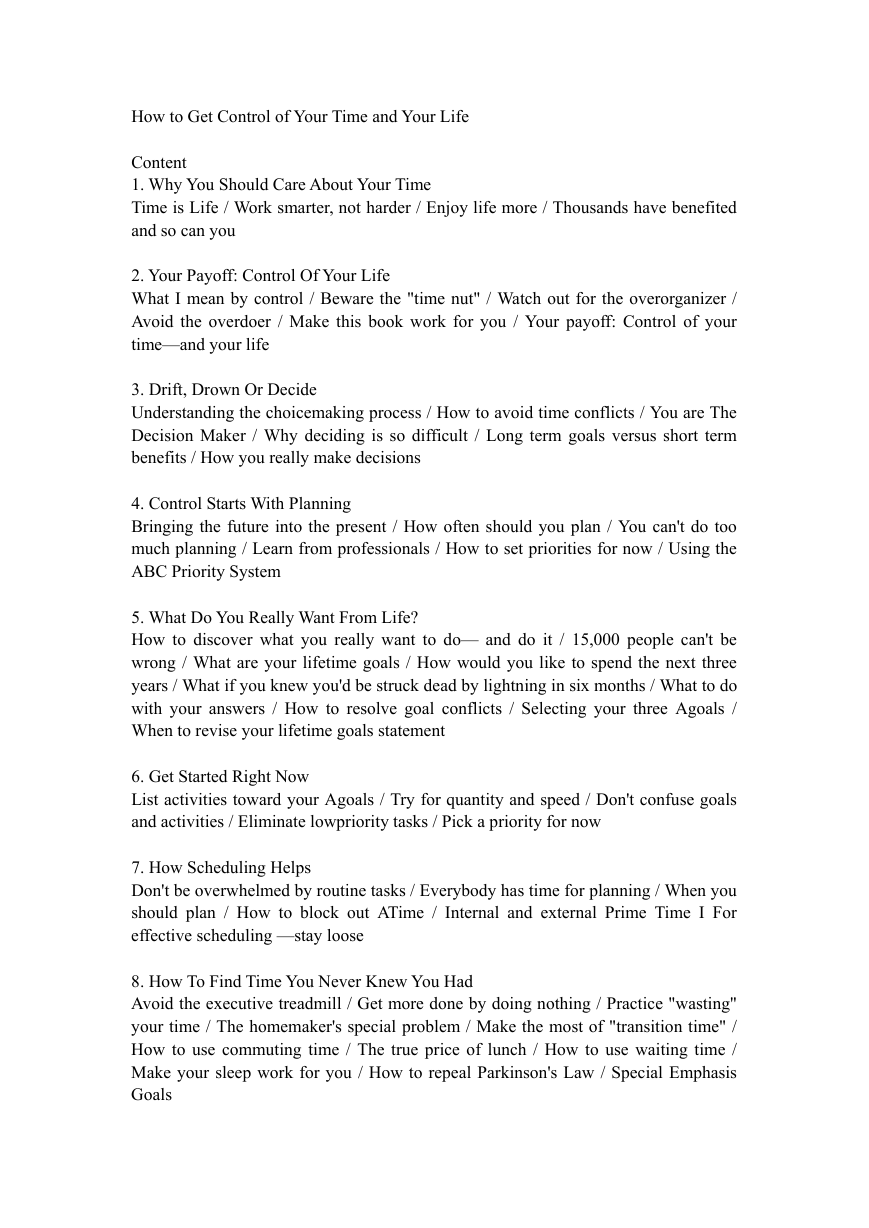

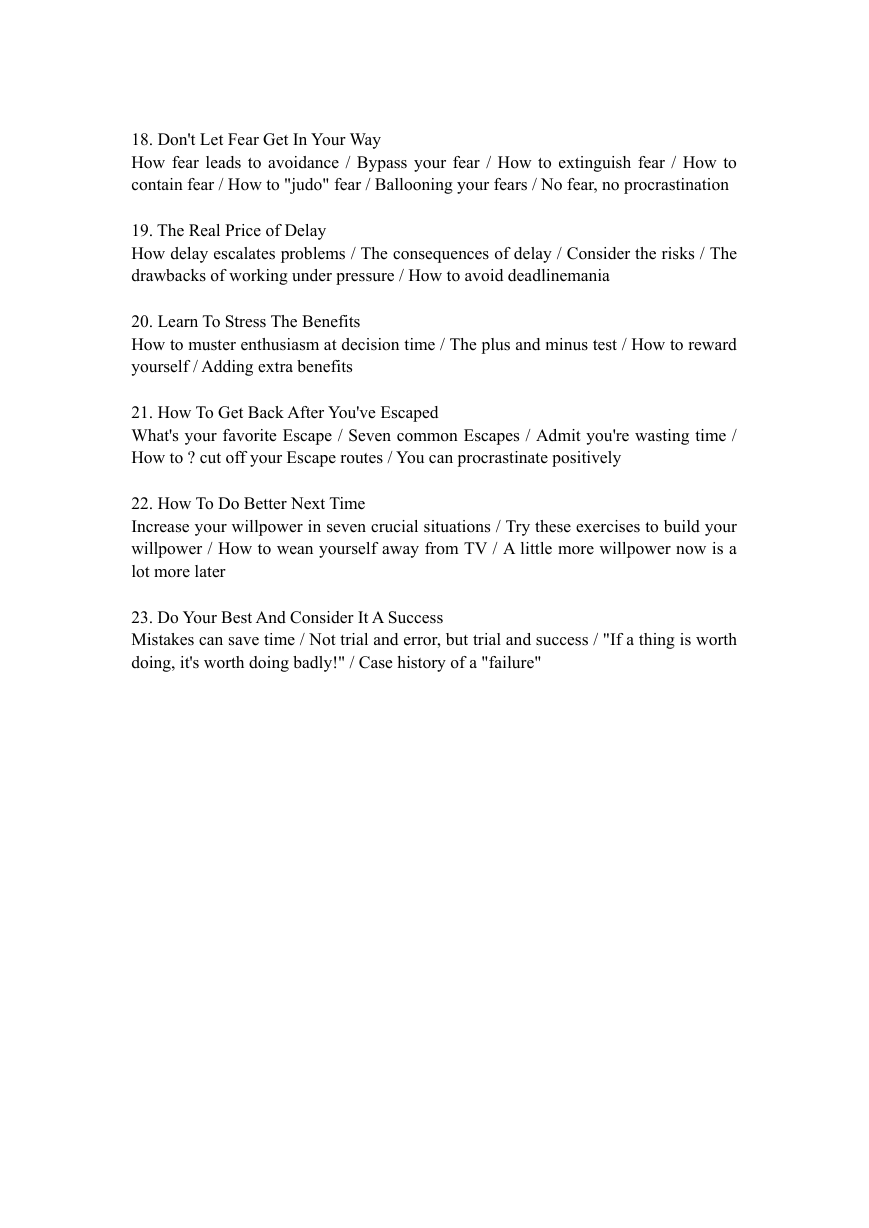
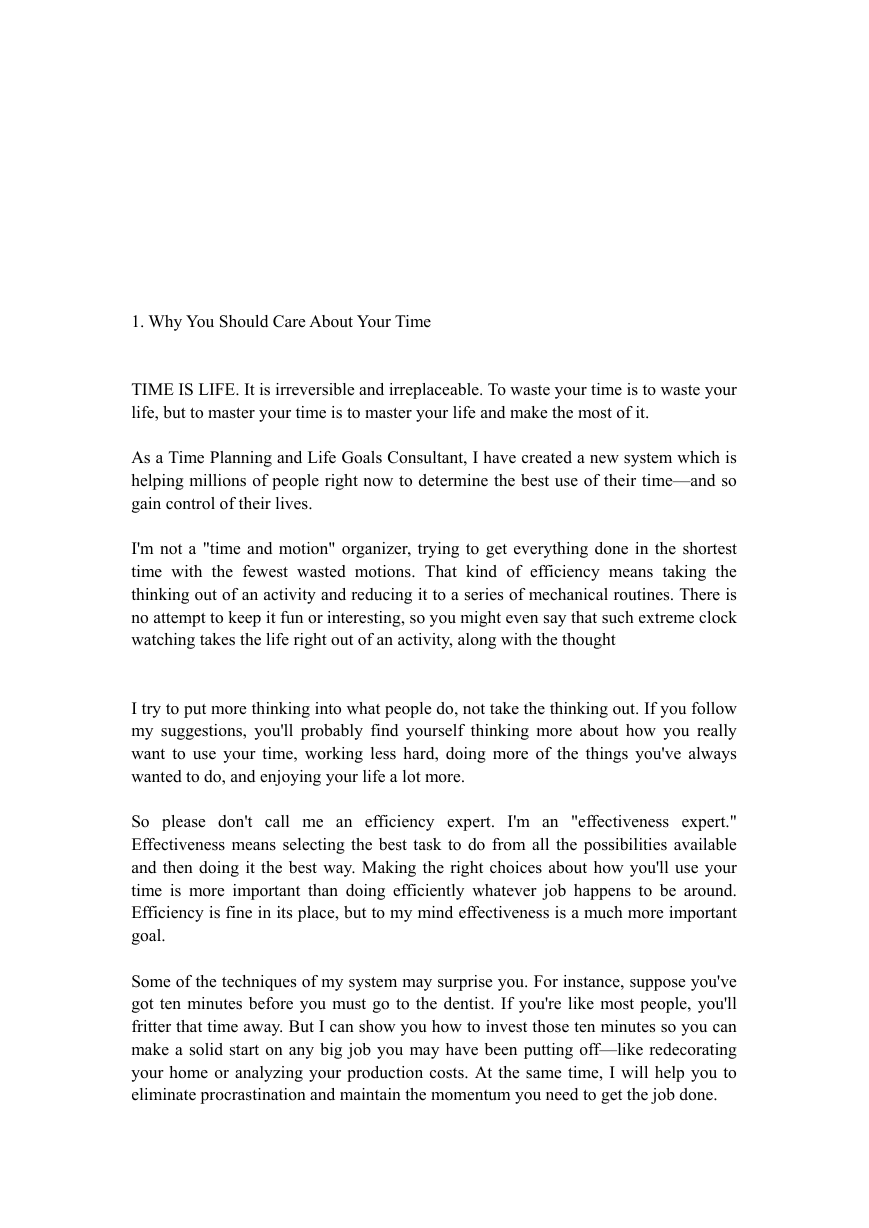
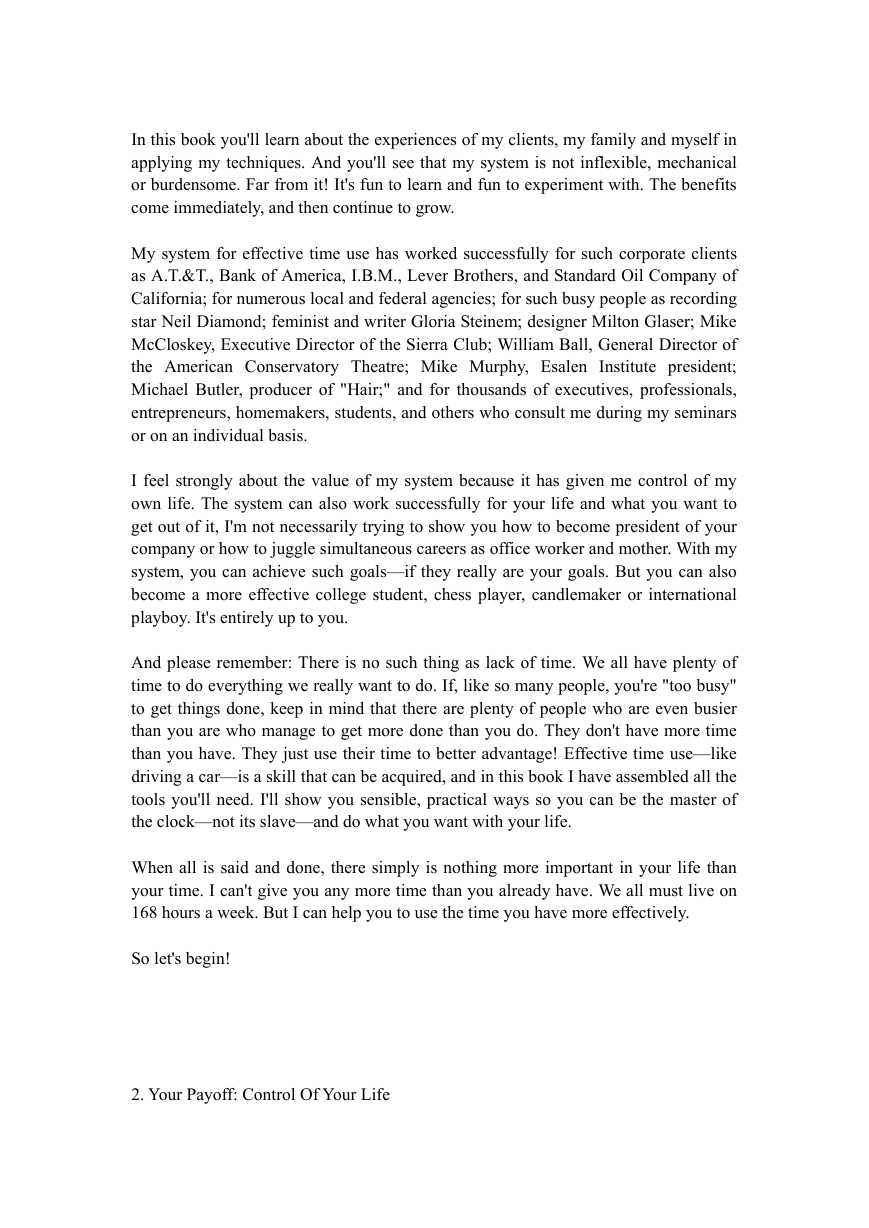

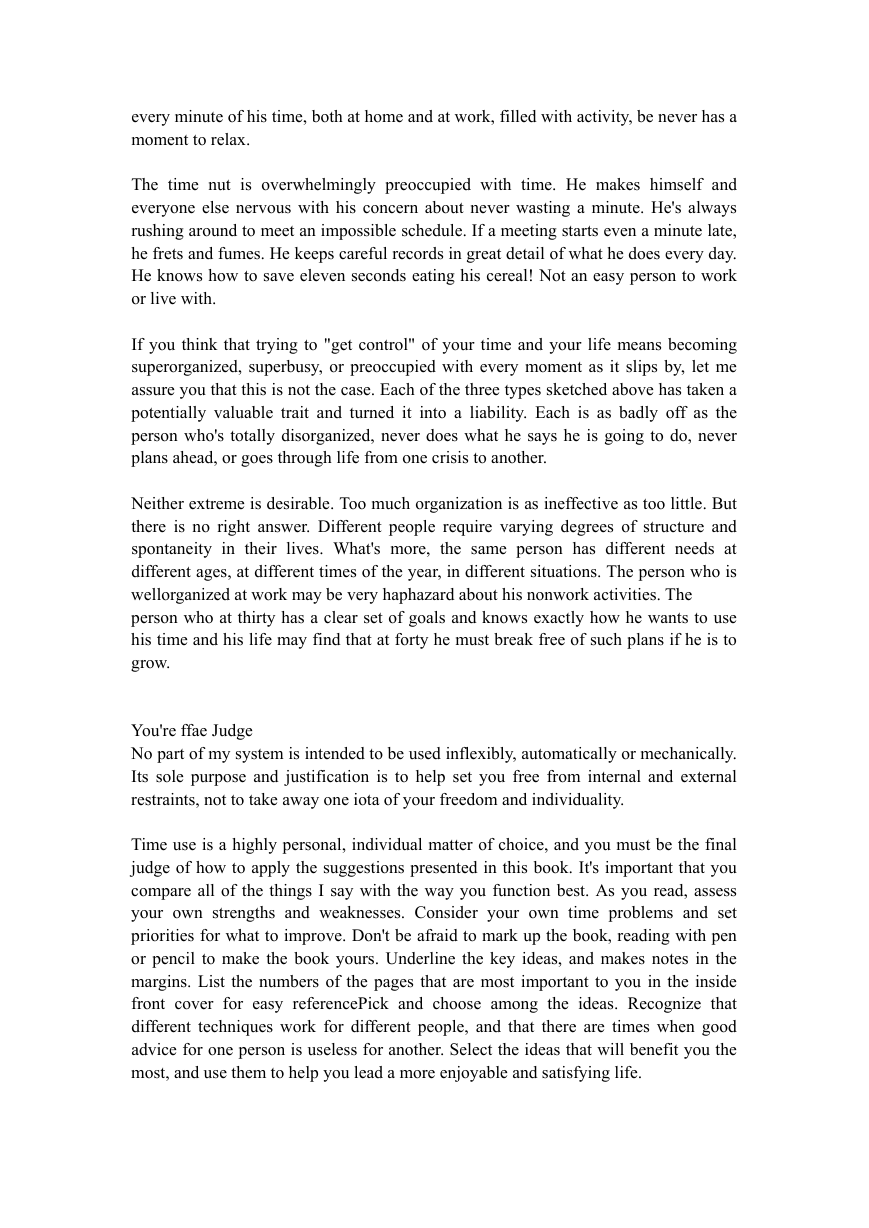
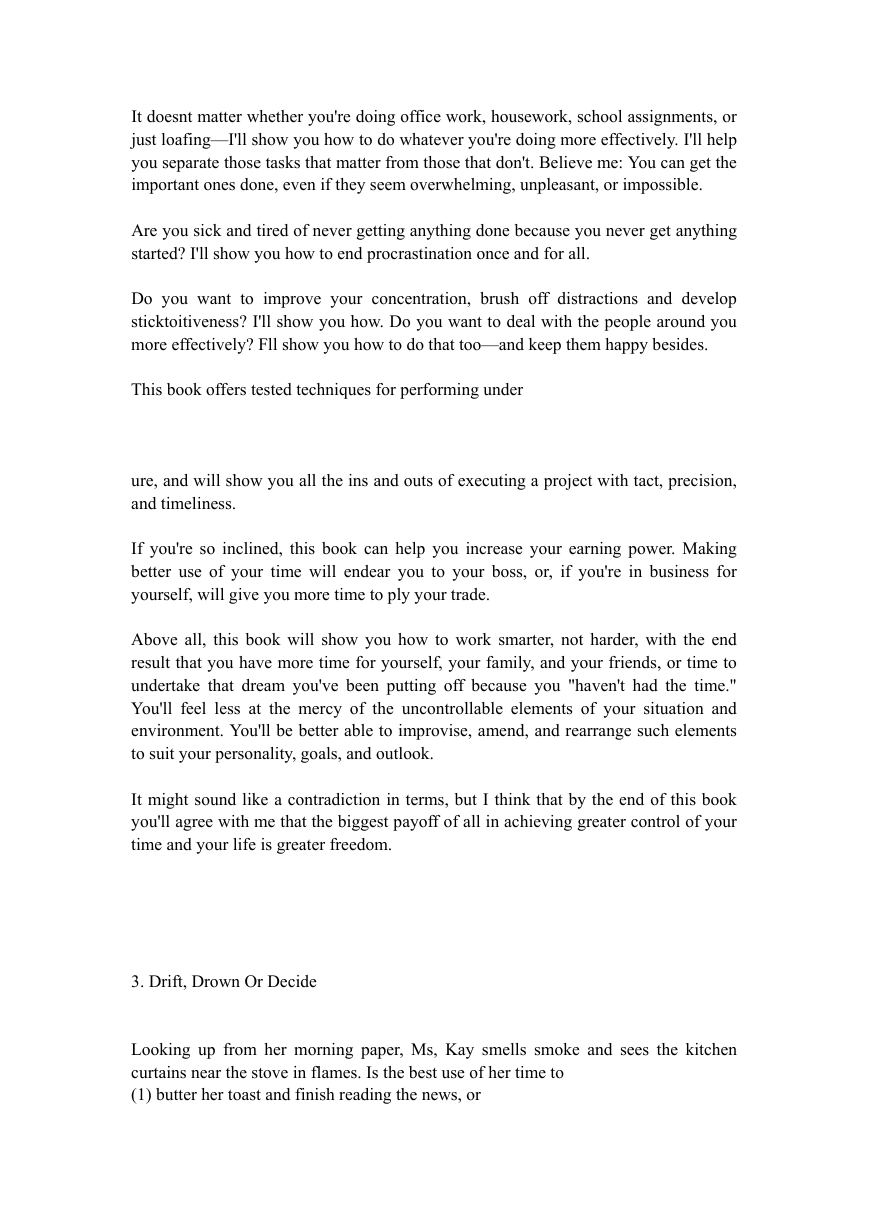








 2023年江西萍乡中考道德与法治真题及答案.doc
2023年江西萍乡中考道德与法治真题及答案.doc 2012年重庆南川中考生物真题及答案.doc
2012年重庆南川中考生物真题及答案.doc 2013年江西师范大学地理学综合及文艺理论基础考研真题.doc
2013年江西师范大学地理学综合及文艺理论基础考研真题.doc 2020年四川甘孜小升初语文真题及答案I卷.doc
2020年四川甘孜小升初语文真题及答案I卷.doc 2020年注册岩土工程师专业基础考试真题及答案.doc
2020年注册岩土工程师专业基础考试真题及答案.doc 2023-2024学年福建省厦门市九年级上学期数学月考试题及答案.doc
2023-2024学年福建省厦门市九年级上学期数学月考试题及答案.doc 2021-2022学年辽宁省沈阳市大东区九年级上学期语文期末试题及答案.doc
2021-2022学年辽宁省沈阳市大东区九年级上学期语文期末试题及答案.doc 2022-2023学年北京东城区初三第一学期物理期末试卷及答案.doc
2022-2023学年北京东城区初三第一学期物理期末试卷及答案.doc 2018上半年江西教师资格初中地理学科知识与教学能力真题及答案.doc
2018上半年江西教师资格初中地理学科知识与教学能力真题及答案.doc 2012年河北国家公务员申论考试真题及答案-省级.doc
2012年河北国家公务员申论考试真题及答案-省级.doc 2020-2021学年江苏省扬州市江都区邵樊片九年级上学期数学第一次质量检测试题及答案.doc
2020-2021学年江苏省扬州市江都区邵樊片九年级上学期数学第一次质量检测试题及答案.doc 2022下半年黑龙江教师资格证中学综合素质真题及答案.doc
2022下半年黑龙江教师资格证中学综合素质真题及答案.doc